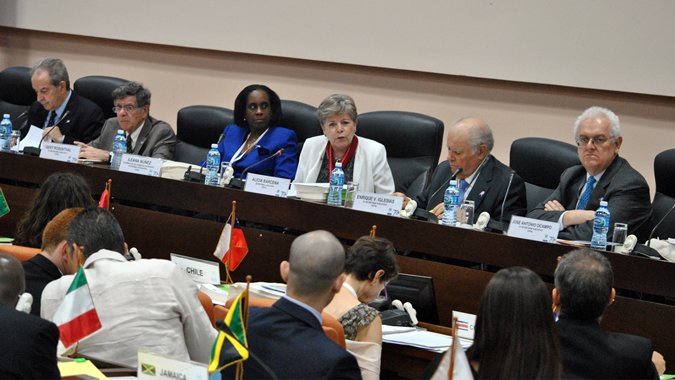ECLAC Reaffirms its Historical Commitment to Equality for the Peoples of Latin America and the Caribbean
United Nations Regional Organization Holds a Seminar Today Commemorating its 70th Anniversary, in the Framework of its Thirty-seventh Session, which is taking place through Friday, May 11 in Cuba.

The Economic Commission for Latin America and the Caribbean (ECLAC) reaffirmed today its historical commitment to equality for the peoples of the region, during a seminar commemorating its 70th anniversary held in Havana, Cuba, in the framework of its thirty-seventh session.
The speakers included the former Executive Secretaries of ECLAC Enrique Iglesias (1972-1985), Gert Rosenthal (1988-1997), José Antonio Ocampo (1998-2003) and José Luis Machinea (2003-2008), along with the current Executive Secretary, Alicia Bárcena. They addressed the institution’s history and contributions to Latin American and Caribbean thinking.
“After 70 years of history, today ECLAC faces the coming decade with a civilizing, universal and indivisible roadmap, the 2030 Agenda, which puts people’s dignity and equality at the center and therefore requires the broadest possible participation of all actors,” ECLAC’s Executive Secretary stated.
“We are convinced that equality must be at the center of sustainable development and that sustainable development occurs when there is a virtuous relationship between economic, social and environmental policies underpinned by a solid institutional framework,” Bárcena added.
The top representative of the United Nations regional organization underscored that “today, when we recognize the effort behind what has been done and the achievements made, we also take on the unequivocal task of continuing to work for a more prosperous region, with greater equality and sustainability.”
The four previous Executive Secretaries of ECLAC who spoke at the seminar recalled their respective periods at the head of the institution and offered an analysis of the current scenario and ECLAC’s role in the development of the region’s countries.
During his talk, Enrique Iglesias highlighted ECLAC’s commitment to the region.
“The vision of Latin America and the Caribbean acting as a unit in the face of economic problems at the United Nations and later in the major stages of integration was really something that characterized ECLAC’s image throughout its history. ECLAC is Latin America and the Caribbean,” he affirmed.
The former Executive Secretary of the institution emphasized its commitment to the United Nations’ fundamental values: the commitment to freedom, democracy and human rights.
“ECLAC is a place where there is a central commitment to being an organization that is useful to the United Nations but, above all, very useful to the peoples of the region,” he indicated.
Gert Rosenthal, meanwhile, stated that “the concern for equality or for the concept that many people truly are left behind, is a very powerful driving force that has appeared since ECLAC’s pioneering literature.”
“Although ECLAC is Latin America and the Caribbean, it is also the United Nations,” he said, adding that “ECLAC practically invented Central American integration, playing the role of the secretariat of the Central American process.”
During his remarks, José Antonio Ocampo assessed the importance of ECLAC’s contributions in five specific areas: the fiscal compact and macroeconomic management in the face of capital movements; productive development in open economies, which emphasized the relevance of integration and technological development; social development, which prioritized social policies with a rights-based approach; the reincorporation of issues related to environmental sustainability in all its main reports; and participation in international debates.
Finally, José Luis Machinea reviewed the events that marked the Commission’s actions during his administration and warned about the need for an integration of Latin America and the Caribbean that continues fostering a productive transformation with equality.
Machinea emphasized the challenges entailed by the current global uncertainty, with the risk of a new financial crisis that, combined with protectionist trends, can have serious consequences.
In the framework of the seminar, the regional organization’s Executive Secretary presented the book Development and Equality: ECLAC’s thinking in its seventh decade. Selected texts from the period 2008-2018, which provides a detailed and careful compilation of 25 texts that are representative of the organization’s intellectual production in the last decade coinciding with the leadership of Alicia Bárcena.
Related event
Thirty-seventh session of ECLAC
El período de sesiones es la reunión bienal más importante de la Comisión Económica para América Latina y el Caribe (CEPAL). Ofrece un foro que permite analizar temas relevantes para el desarrollo de…
Type
Country(ies)
- Latin America and the Caribbean